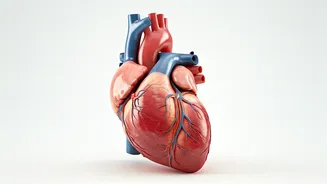Nourishing Your Heart
The cornerstone of a healthy heart lies in what you consume. Certain foods provide vital support for cardiovascular function. Incorporate heart-healthy
choices into your daily meals. Consider foods such as fatty fish, like salmon, packed with omega-3 fatty acids known to reduce inflammation and triglycerides. Embrace the Mediterranean diet that prioritizes olive oil, vegetables, fruits, and whole grains, which has been consistently linked to improved heart health. Regular consumption of foods rich in fiber, such as oats and beans, helps lower cholesterol levels, reducing the risk of heart disease. Prioritize fresh, unprocessed foods. Stay hydrated by drinking plenty of water every day. Be mindful of portion sizes to maintain a healthy weight, which is essential for cardiac health. Limit your intake of saturated and trans fats found in processed foods. Reduce sodium intake to control blood pressure. Remember, a heart-healthy diet is a long-term commitment, not a temporary fix. Consistency is key, and small, sustainable changes can yield significant benefits over time.
Recognizing Heart Failure
Heart failure is a serious condition in which the heart cannot pump enough blood to meet the body's needs. Understanding its causes, symptoms, and risk factors is crucial. The primary causes of heart failure include coronary artery disease, high blood pressure, and damage to the heart muscle. Symptoms can vary but often include shortness of breath, fatigue, and swelling in the legs and ankles. Individuals may also experience rapid or irregular heartbeats. Diagnosis usually involves a physical exam, medical history review, and various tests, such as an echocardiogram, electrocardiogram (ECG), and blood tests. Several factors increase the risk of heart failure, including age, family history, and underlying conditions like diabetes and obesity. Management typically involves lifestyle changes, medications, and, in some cases, medical procedures like pacemakers or heart transplants. Early detection and proactive management can significantly improve outcomes and quality of life for those affected. Seek medical attention promptly if you suspect you may be experiencing symptoms of heart failure.
Silent Attack Warning
A silent heart attack, also known as a silent myocardial infarction, is a heart attack that either has no symptoms or has mild symptoms that are often overlooked. It's a dangerous condition as it can cause significant heart damage without the person realizing they are at risk. Common symptoms of a silent heart attack include mild chest discomfort, shortness of breath, indigestion, or fatigue. Sometimes, people mistake these symptoms for other conditions, delaying diagnosis and treatment. Risk factors for silent heart attacks are similar to those for regular heart attacks, including high blood pressure, high cholesterol, smoking, diabetes, obesity, and a family history of heart disease. People at higher risk, such as those with diabetes, may not feel chest pain as clearly due to nerve damage. Prompt medical evaluation is critical for anyone experiencing these symptoms, especially if they have risk factors. Diagnosis may involve an ECG, blood tests, and imaging. Immediate treatment is essential to minimize damage to the heart and prevent complications. Regular check-ups and a healthy lifestyle can help detect and mitigate risk. Awareness of these signs and prompt action can save lives.
Proactive Heart Care
Taking proactive steps to protect your heart health is vital for a longer, healthier life. Regular exercise is essential, aiming for at least 150 minutes of moderate-intensity or 75 minutes of vigorous-intensity aerobic exercise per week. Maintain a healthy weight by consuming a balanced diet and controlling portion sizes. Regular monitoring of blood pressure and cholesterol levels is also essential. Get regular check-ups with your doctor and disclose any family history of heart disease. Avoid smoking and limit alcohol consumption. Manage stress through relaxation techniques such as meditation or yoga. Prioritize adequate sleep and establish consistent sleep patterns. Take medications as prescribed by your doctor and attend all follow-up appointments. Stay informed about the latest advances in heart health and be aware of any new symptoms. By making conscious lifestyle choices and following medical advice, you can significantly reduce your risk of heart disease and improve your overall well-being. Remember, small changes today can make a big difference in your heart health tomorrow. Prioritize your heart health for a longer and more fulfilling life.





















